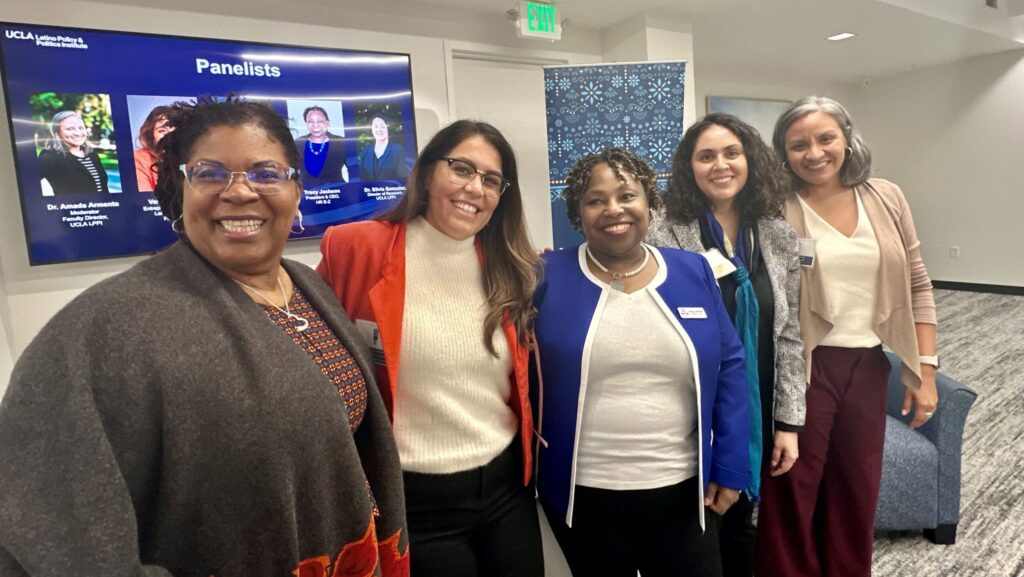Latina and Black Women Entrepreneurs Policy Forum Highlights Barriers and Solutions

On February 4, over 40 women policymakers, researchers, and business leaders convened at UC Center Sacramento for the Latina and Black Women Entrepreneurs Policy Forum, hosted by the UCLA Latino Policy and Politics Institute (LPPI). The event examined structural inequities facing Latina and Black women entrepreneurs in California and explored data-driven policy solutions to foster equitable economic opportunities, ensuring that these women are at the center of policy in the rebuilding of Los Angeles in the wake of the January 2025 wildfires.
Supported by JP Morgan & Chase Global Philanthropy, the James Irvine Foundation, and the Latina Futures Lab 2050, the event opened with remarks from Assemblymember Mia Bonta (D-18), who underscored the need for facts and research to address systemic barriers and counter misinformation. “Our generational wealth is on the line. Our humanity is on the line … we are going to need to hold true to what we know, and we are going to have to base what we know not only in our lived experience but—thanks to the Latino Policy and Politics Institute—facts, research, data, and evaluation.”
Data-Driven Insights on Economic Disparities
Dr. Silvia R. González, director of research at LPPI, presented findings from The Economic Recovery & Entrepreneurship Project (TEREP), highlighting the growth of women-owned businesses as well as the stark disparities in financial access and economic security for these entrepreneurs. While women-owned businesses comprised 40% of California’s small businesses in 2021, Latinas owned only 25% and non-Latina Black women just 7%. Most operated as non-employer businesses, which, while showcasing the entrepreneurial spirit of women, also limits their growth potential. Financial constraints often forced them to rely on personal savings rather than business loans. The research also revealed higher rates of uninsured self-employed Latina and Black women, exposing gaps in healthcare access and economic security.
Empowering Women Entrepreneurs Through Collective Action
A panel discussion, moderated by Dr. Amada Armenta, the institute’s faculty director, featured Veronica Vences (Latino Community Foundation), Tracy Jackson (HR E-Z), Dr. Tara Lynn Gray (California Office of the Small Business Advocate), and Dr. González. Panelists emphasized the need for stronger financial infrastructure, inclusive lending, and expanded mentorship opportunities. Dr. González stressed that research-backed policies are critical to reshaping funding models and building long-term support networks.
Attendees then participated in breakout discussions, strategizing on increasing capital access, strengthening entrepreneurial ecosystems, and closing racial and gender gaps in business ownership and disaster preparedness. Tracy Jackson reflected on the event’s impact: “I really enjoyed the ability to learn, collaborate, and network in a space focused on the unique needs of women of color entrepreneurs.”
Jessica Anguiano, founder and CEO of Maravillosa Movement, described the forum as empowering.
“There is something incredibly powerful about being in a room filled with resilient, passionate women who refuse to be silenced,” said Anguiano. “Despite the frustration of systemic inequities, I left feeling stronger, more determined, and hopeful. Knowing that organizations like LPPI are at the forefront of this fight reaffirmed that our collective power is unstoppable.”
Liliana Rogers, from the BBOP Center – an entrepreneurial organization designed specifically for women of color to build, grow, and scale profitable businesses located in San Bernardino – added, “Being surrounded by so many dedicated individuals committed to supporting and empowering Latinas making a difference in the community was truly inspiring. Additionally, hearing the latest statistics on Latina progress and potential was both enlightening and encouraging. As a Latina business owner, I found the event very beneficial.”
For more information on LPPI’s Economic Recovery & Entrepreneurship Project, visit latinoterep.com.








